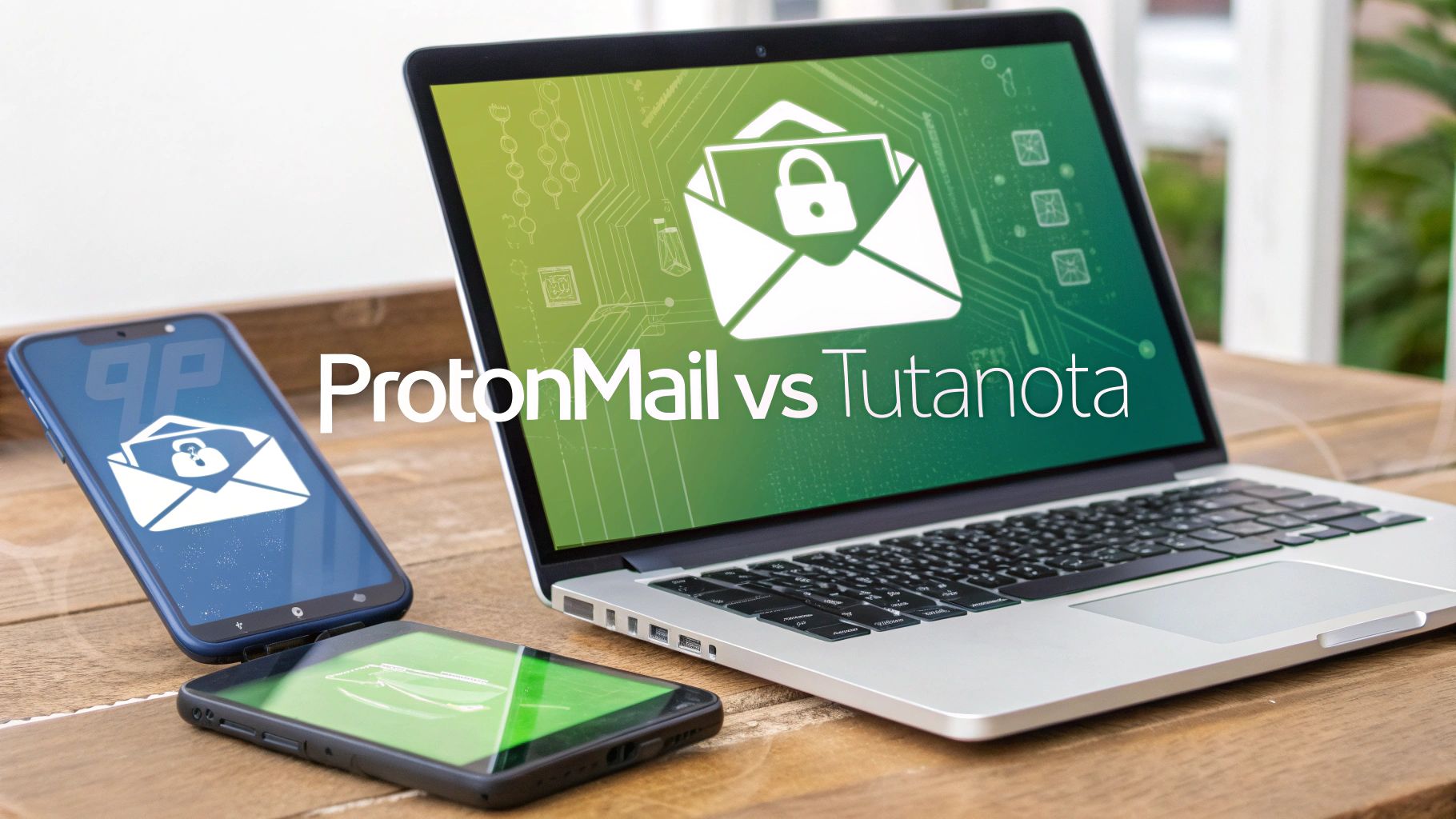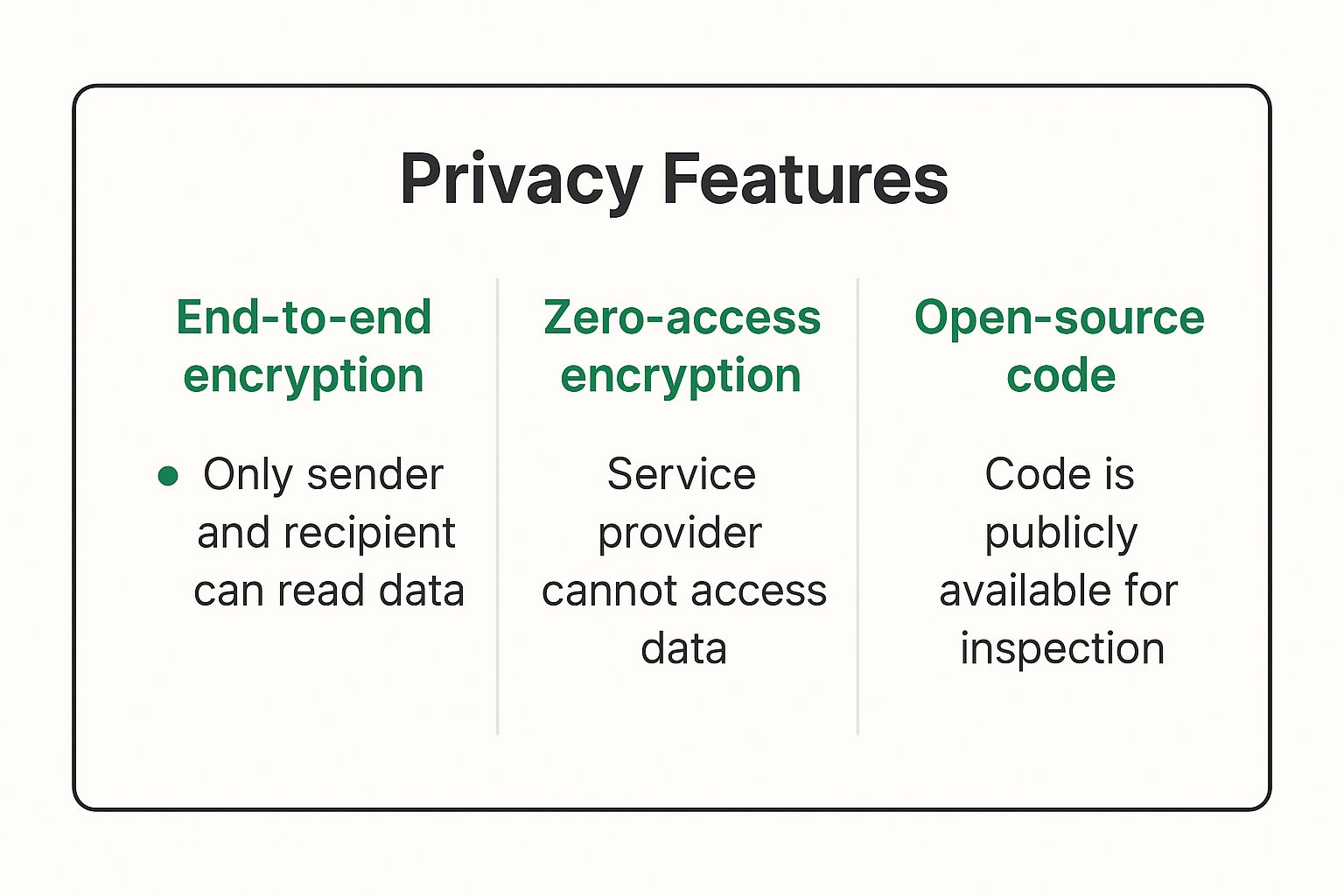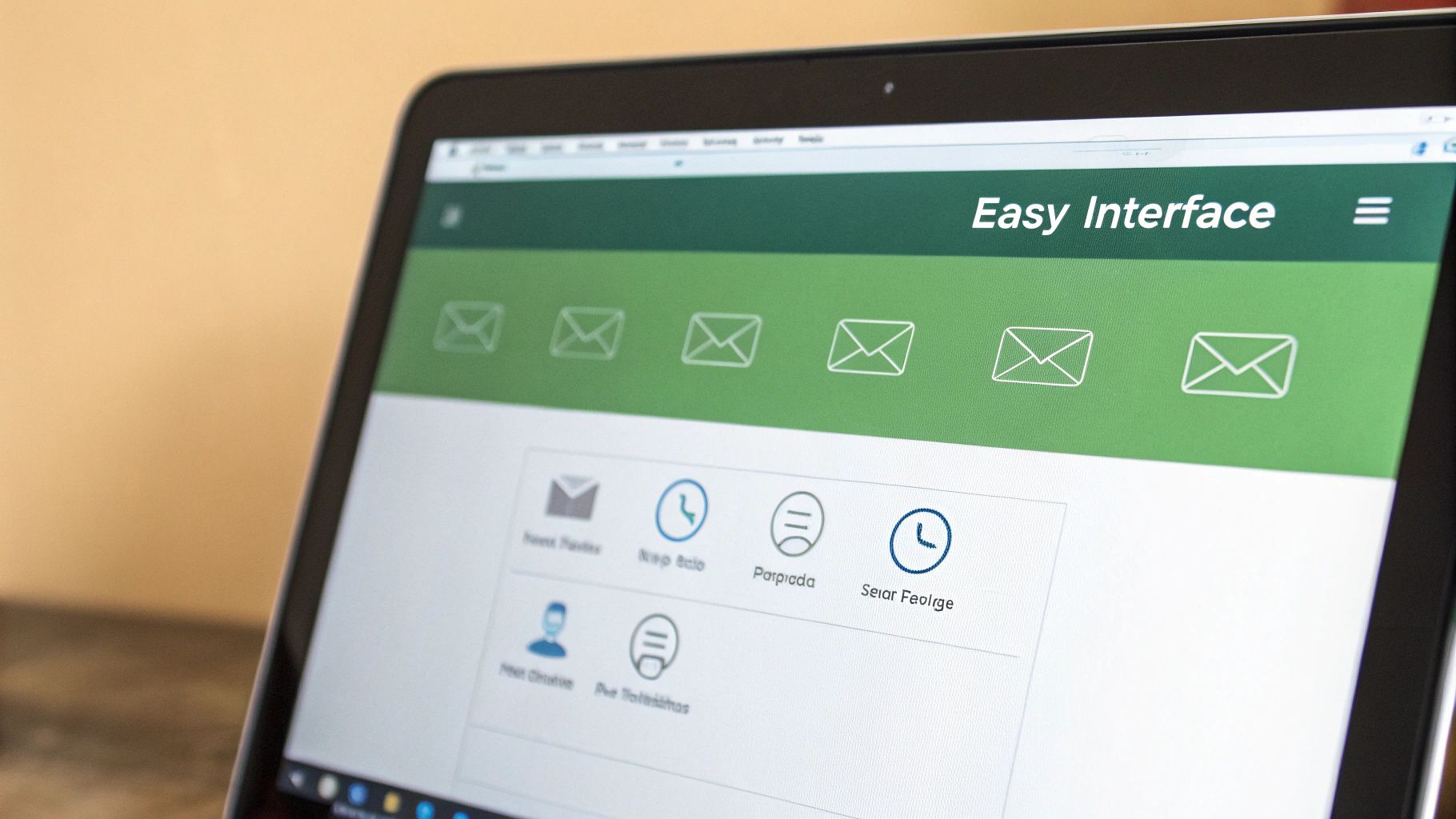ProtonMail vs Tutanota: A Head-to-Head Guide to Email Privacy

When choosing between ProtonMail and Tutanota, the decision hinges on your personal privacy and security priorities. If your top concern is jurisdictional privacy—meaning where the hosted email platform is legally based—ProtonMail’s Swiss headquarters provides a significant legal shield. However, if you're seeking the most comprehensive technical email security out of the box, Tutanota’s policy of encrypting subject lines by default creates a more tightly sealed environment.
Comparing Email Privacy and Security on Hosted Platforms
In the world of secure, hosted email platforms, ProtonMail and Tutanota are the undisputed leaders. Unlike mainstream providers that often mine your inbox for advertising data, both of these services are founded on the principle of zero-access encryption. This security model ensures that no one—not even employees at Proton or Tutanota—can read your messages, guaranteeing a high level of email privacy.
So, where do they differ? The critical distinctions lie in their legal jurisdictions and the specific nuances of their email security and encryption technologies.
This image lays out the core privacy promises that both hosted platforms deliver on.

As you can see, both services share a strong foundation of end-to-end encryption and a commitment to open-source code for transparency. With that common ground established, let's explore the details that truly set them apart in the battle for superior email privacy.
ProtonMail vs Tutanota At a Glance
Before we delve into a detailed analysis, this table offers a quick snapshot of the key differences in email security and privacy that are most critical for users making a decision.
| Feature | ProtonMail | Tutanota |
|---|---|---|
| Legal Home | Switzerland (Strong privacy laws, outside intelligence alliances) | Germany (Member of the 14 Eyes intelligence alliance) |
| Subject Encryption | Optional (via Encrypted Subject extension) | Yes (encrypted by default) |
| Encryption Standard | OpenPGP (Widely adopted industry standard) | AES and RSA (Custom, open-source implementation) |
| Free Storage | 1 GB | 1 GB |
| Service Ecosystem | Mature suite (VPN, Drive, Calendar, Pass) | Developing (Encrypted Calendar, with more planned) |
This high-level view is a great starting point. ProtonMail leverages its strong Swiss jurisdiction and a mature product ecosystem, while Tutanota focuses intently on encrypting more data by default. Now, let’s explore how these differences impact your overall email security and privacy.
Where Your Data Lives Matters: A Jurisdictional Showdown

When selecting a secure email platform, it's easy to focus solely on encryption and overlook a critical factor: the company's legal jurisdiction. The physical location of a hosted email platform's servers dictates which laws govern your data. This principle, known as data sovereignty, is central to the ProtonMail vs Tutanota debate and is a cornerstone of email privacy.
At its core, you have ProtonMail, which is famously based in Switzerland, and Tutanota, which operates out of Germany. While both countries have strong data privacy laws, their international legal obligations create very different security shields for your data.
ProtonMail’s Swiss Fortress
ProtonMail’s choice of Switzerland as its legal home is a strategic decision for email privacy. The country has a long, storied history of neutrality and some of the toughest privacy laws in the world. This provides a tangible legal barrier against foreign government surveillance.
The key benefit here is that Switzerland is not a member of the EU or any major intelligence-sharing alliances like the Five, Nine, or Fourteen Eyes. For anyone whose primary threat model includes government surveillance, this is a massive advantage for their email security.
Because it operates outside of major intelligence-sharing pacts, ProtonMail is in a much stronger legal position to fight off data requests from foreign governments. Think of it as a legal firewall against widespread surveillance programs.
Any government wanting access to ProtonMail user data must go through the Swiss court system. This process is notoriously slow, requires a high burden of proof, and demands evidence of criminal activity as defined under strict Swiss law. Broad, "fishing-expedition" style requests are not permissible.
Tutanota and German Law
Tutanota, on the other hand, is headquartered in Germany. This grants it the full protection of the EU's General Data Protection Regulation (GDPR), which is excellent for preventing corporate data abuse and is a strong pillar of modern data privacy.
However, there's a significant caveat for email security. Germany is a member of the "14 Eyes" intelligence-sharing alliance.
This group, which includes countries like the U.S., U.K., and Canada, agrees to cooperate and share intelligence. While Tutanota’s end-to-end encryption keeps your email content safe, its location in a 14 Eyes country means that metadata could potentially be exposed to member agencies if a valid legal order is issued.
Ultimately, both providers have chosen jurisdictions with strong privacy protections, but they play by different rules. ProtonMail's Swiss base offers a powerful defense against international surveillance, while Tutanota leverages Germany’s solid GDPR framework but sits within the 14 Eyes network. For users prioritizing insulation from international data-sharing agreements, ProtonMail clearly has the jurisdictional edge.
Comparing Encryption and Security Models

When you dig into the ProtonMail vs Tutanota debate, the conversation inevitably turns to encryption. Both services are built on the promise of end-to-end encryption, a security model that ensures only you and your recipient can ever read your messages. If you're new to the concept, our guide explains what is end-to-end encryption and why it's so vital for email privacy.
But how each service implements this technology reveals a lot about their core email security philosophies. These aren't just minor technical details; they have a real impact on what parts of your data are truly kept private.
The Foundation of Trust: ProtonMail and OpenPGP
ProtonMail built its system on OpenPGP (Pretty Good Privacy). This isn't a new, proprietary protocol; it's an open industry standard that has been vetted and battle-tested by security experts for decades. Its strength lies in its transparency and proven resilience.
Using an open standard offers a key security advantage: interoperability. You can send an encrypted email from ProtonMail to someone using a different PGP-compatible client, expanding your circle of secure communication beyond the ProtonMail ecosystem.
However, the standard PGP protocol does not encrypt email subject lines. This piece of metadata, while seemingly small, can reveal significant context about your conversations, even when the email body is fully secure.
Tutanota's Comprehensive Encryption Approach
Tutanota took a different path, developing its own encryption protocol combining AES and RSA. While custom protocols can raise security concerns, Tutanota mitigates this by making their code completely open-source for public scrutiny. Their primary goal was to encrypt more data by default.
This is where Tutanota's email security model excels. Its system encrypts not only the email body but also your subject lines, contact lists, and even your calendar entries by default. This creates a much more complete privacy bubble where nearly all associated metadata is protected automatically.
This difference gets right to the heart of the decision. ProtonMail offers the proven reliability and interoperability of the OpenPGP standard. Tutanota, on the other hand, provides a more sealed ecosystem by encrypting metadata that others leave exposed.
So, which is better for your email privacy? It depends on your personal threat model. If your top priority is preventing any metadata leakage, Tutanota’s comprehensive approach is the clear winner. But if you value the decades-long trust and interoperability that come with an industry-standard protocol, ProtonMail’s use of OpenPGP is a powerful argument for its security model.
Diving Into Usability and Day-to-Day Experience
All the email security in the world is useless if a hosted platform is difficult to use. In the ProtonMail vs Tutanota comparison, user experience is critical. Both aim to be your primary inbox, so they need to be convenient, not a security chore.
ProtonMail has clearly invested in a slick, modern interface. For users migrating from Gmail, the experience is intuitive and familiar. It’s clean, well-organized, and includes user-friendly features like drag-and-drop, custom folders, and keyboard shortcuts. This polished feel is a major advantage for non-technical users seeking better email privacy.
Tutanota, on the other hand, prioritizes function over form. Its interface is clean and perfectly usable, but it has a more utilitarian aesthetic. Some users appreciate its simplicity, while others may find it basic compared to ProtonMail’s more refined design.
How They Handle Mobile Security
For most, email is a mobile-first activity, making mobile app security crucial. ProtonMail's Android and iOS apps are smooth and native, offering an experience as polished as the web version. Its push notifications are reliable, but there's a small privacy trade-off: they rely on Google Play Services on Android.
Tutanota’s mobile apps are functional, though they can sometimes feel less like a native app and more like a web wrapper. The major privacy win for Tutanota is its custom push notification system, which completely bypasses Google's infrastructure. For users on de-Googled operating systems like GrapheneOS, this is a game-changer for both privacy and functionality.
When it comes to usability, the ProtonMail vs. Tutanota decision often boils down to polish versus principles. ProtonMail delivers a refined, mainstream experience, while Tutanota makes deliberate security trade-offs—like its independent notification system—that resonate with a hardcore privacy-focused audience.
Beyond the Inbox: The Security Ecosystem
Your digital life extends beyond email, and that's where the broader product ecosystem of these hosted platforms becomes important. Proton has built out a mature suite of integrated, privacy-focused tools.
What you get with Proton:
- Proton Calendar: A full-featured, encrypted calendar.
- Proton Drive: Secure cloud storage with end-to-end encryption.
- Proton VPN: One of the most trusted and reputable VPNs available.
- Proton Pass: A secure password manager for your credentials.
This all-in-one approach allows you to secure your entire digital footprint within a single, trusted environment.
Tutanota is also expanding its offerings with an excellent encrypted calendar and has more services planned, but it does not yet match the comprehensive nature of Proton's suite. For users seeking a complete, interconnected privacy solution today, Proton’s ecosystem is fully developed and ready to use.
Breaking Down Pricing Tiers And Feature Value

Most users first experience encrypted email through the free plans offered by hosted platforms like ProtonMail and Tutanota. Both provide a solid entry point for enhanced email privacy, but their limitations are designed to encourage an upgrade.
With either service, the free plan includes 1 GB of storage. This is sufficient for light personal use, but heavy email users will quickly reach this limit.
The free tier experience also has important differences impacting email security. Proton caps free users at 150 messages per day to prevent abuse. Tutanota, however, uses a more dynamic limit based on usage patterns, primarily to deter spammers. These free plans are an excellent way to test each platform's interface and features before committing to a paid plan.
Free vs. Paid: Unlocking True Email Security
Upgrading to a paid plan is where you unlock the full power of these hosted email platforms. You're not just paying for more storage; you're investing in key features like custom domain support, additional email addresses (aliases), and a wider range of privacy and security tools.
For example, ProtonMail's starter paid plan, Mail Plus, provides 15 GB of total storage (shared with Proton Drive), support for one custom domain, and up to 10 email addresses. Tutanota's comparable plan, Revolutionary, offers 20 GB of storage, one custom domain, and a generous 15 email aliases.
The choice between paid plans really boils down to this: ecosystem versus specialization. ProtonMail sells an all-in-one privacy suite, while Tutanota offers a highly focused secure email package with more aliases at a lower price point.
This highlights their different long-term visions. Proton is building a complete, secure replacement for your digital life, while Tutanota remains laser-focused on perfecting the secure email experience. The "better" value depends entirely on whether you need one powerful tool or a whole interconnected toolkit for your digital privacy.
Side-By-Side Plan Comparison
To help you see exactly what you get for your money, the table below breaks down the key features for the most popular plans aimed at individuals. Keep in mind that both providers offer business plans with extra features like user management and organization-wide settings.
Pricing and Feature Comparison
| Plan Tier | ProtonMail Features & Cost | Tutanota Features & Cost |
|---|---|---|
| Free | 1 GB storage, 1 address, 150 messages/day, limited support. | 1 GB storage, 1 address, 1 calendar, limited search functionality. |
| Personal | Mail Plus: 15 GB storage, 1 custom domain, 10 addresses, unlimited messages. | Revolutionary: 20 GB storage, 1 custom domain, 15 aliases, unlimited search. |
| Family | Visionary: 3 TB storage, 10 custom domains, 100 addresses, for 6 users. | Not directly comparable; Tutanota users typically buy multiple individual accounts for family use. |
When you look at the numbers, Tutanota often emerges as the more budget-friendly choice, especially for users who need many aliases and email storage but don't require an integrated VPN or cloud drive.
Conversely, ProtonMail’s higher price reflects its value as an all-in-one security suite. This makes it a compelling option if your goal is to secure your entire digital footprint under one trusted, hosted platform.
Tying Up Loose Ends: Your ProtonMail vs. Tutanota Questions Answered
When comparing two top-tier secure email platforms, the final decision often comes down to a few practical questions about email security and daily use.
Let's address the most common queries that arise when choosing between ProtonMail and Tutanota, focusing on the real-world implications for your privacy and security.
Which Is Better for Non-Technical Users?
For those seeking enhanced email privacy without a steep learning curve, ProtonMail is the clear winner. Its design is polished and familiar, closely resembling mainstream services like Gmail. This makes the transition to a secure platform much smoother for non-experts.
Tutanota is perfectly functional, but its interface is more utilitarian. For someone new to secure email, ProtonMail’s cohesive ecosystem and intuitive design require less effort to get started.
Can I Use Third-Party Email Clients?
This is a major point of difference in their email security models.
ProtonMail allows the use of desktop clients like Thunderbird or Outlook. Their official Proton Mail Bridge tool, included with paid plans, handles encryption in the background, letting you use your preferred email app without compromising security.
Tutanota, conversely, is a completely closed ecosystem. It does not support IMAP or POP3, the protocols required for third-party app integration. You must use their dedicated web, desktop, or mobile applications. While this walled-garden approach enhances security by design, it eliminates flexibility.
The takeaway is simple: If using a third-party client like Thunderbird is essential to your workflow, ProtonMail is your only viable choice. Tutanota's closed security model is a non-starter for this use case.
How Does Password Recovery Work?
The password recovery process highlights the different security philosophies of these hosted platforms. Both use zero-knowledge encryption, meaning neither company can access or reset your password. This has significant implications for account recovery.
- ProtonMail: Offers multiple recovery options. You can set a recovery email or phone number for convenience, though this creates a potential security weak point. For maximum security, they also provide a recovery phrase to store safely.
- Tutanota: Adopts a much stricter security posture. Upon signup, you are given a single, powerful recovery code. If you lose your password and this code, your encrypted data is permanently inaccessible. There is no backdoor.
This is a critical distinction. ProtonMail provides a safety net, trading a small amount of theoretical security for user convenience. Tutanota prioritizes absolute security, placing the full responsibility on the user. Your choice depends on your comfort level with that level of personal responsibility for your own email security.
If you're looking for a hosted email platform that combines robust security with straightforward usability and sovereign data control, consider Typewire. We offer a secure, ad-free email experience on our privately owned Canadian servers, ensuring your data is never tracked or mined. Explore our features with a no-obligation 7-day free trial. https://typewire.com
ProtonMail vs Tutanota: A Head-to-Head Guide to Email Privacy
Posted: 2025-09-30
Professional Email Greeting: Master the professional email greeting today
Posted: 2026-02-10
What is Email Phishing: Securing Your Inbox Against Digital Fraud
Posted: 2026-02-06
10 Email Retention Policy Best Practices for Security and Privacy in 2026
Posted: 2026-02-03
Top 12 Secure Alternatives to Gmail for Privacy in 2026
Posted: 2026-01-31
What Is Email Alias: A Guide to Better Email Security and Privacy
Posted: 2026-01-27
How to Send an Encrypted Email and Protect Your Digital Privacy
Posted: 2026-01-23
Email Hosting Canada The Definitive Guide to Privacy and Security
Posted: 2026-01-20
How to Send Email Securely: A Guide to Real Privacy & Security
Posted: 2026-01-16